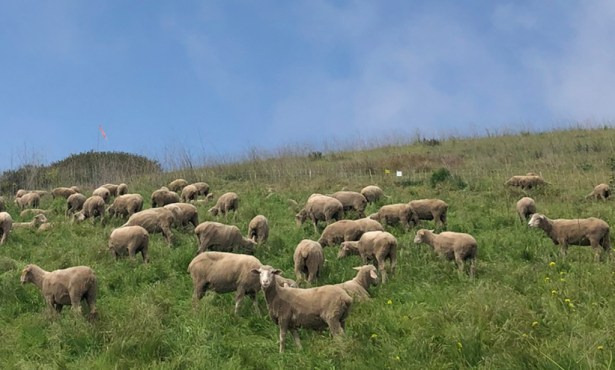Cachuma Lake Given Maximum Protection from Invasive Species Santa Barbara County Extends Vessel Quarantine to 30 Days
The County of Santa Barbara Community Services Department Parks Division has received Board of Supervisor’s approval to increase protection from aquatic invasive species at Cachuma Lake. Staff will be enforcing a 30 day vessel quarantine on all trailered vessels entering Cachuma Lake, which is an extension of the current 14 day quarantine period. A longer quarantine period provides additional protections against the invasive species.
There are two exceptions to the new quarantine policy: 1) Vessels that already have a Cachuma Lake boat launch security tag will not have to be inspected, and 2) Kayaks and canoes will be allowed to launch after passing the inspection program power wash. With more stringent quarantine protocols the lake can continue recreational boating. The County has been conducting Aquatic Invasive Species inspections on vessels being launched at Cachuma Lake since 2008. To date, staff has no indications that Cachuma Lake has been exposed to Quagga or Zebra Mussels, and early detection monitoring has detected no mussels. In December 2013, mussels were discovered in Lake Piru, 55 miles from Cachuma Lake. Lake Piru is the first lake infected by the Quagga Mussel that is not fed by the Colorado River system. As a result, it is necessary for the County of Santa Barbara Parks Division to strengthen its inspection and quarantine protocols.
Quagga and Zebra Mussels (Mussels) are non-native aquatic nuisance species originating in Eastern Europe freshwaters. They clog waterways, undermine healthy lake ecosystems, and create costly maintenance for water resource agencies. Mussels are believed to have been introduced into the Great Lakes region in 1988 through ballast water emptied from ships, and they spread throughout the Midwest and the eastern portion of the United States. Quagga Mussels were first discovered in the Colorado River system in January 2007 and have recently been found in 25 Southern California water bodies connected to the Colorado River via aqueducts and canals. Zebra Mussels were discovered in San Justo Reservoir in San Benito County in January 2008. Mussels spread primarily by two methods: (1) Adult mussels that have adhered to surfaces, such as a boat hull, and are introduced to a water body or system, or; (2) Microscopic larval forms, known as “veligers”, that live in the water column and can survive in water carried by recreational boats in bilges, live wells, and other areas where water can pool and remain, and are transported into a water body or system. The spread of the Quagga Mussel in California is becoming a significant concern due to the economic and environmental impacts associated with their introduction and proliferation. Quagga Mussels
PARKS DIVISION
610 Mission Canyon Road Santa Barbara, CA 93105 (805) 568-2461 FAX (805) 568-2459 www.SBParks.org
P R E S S PARKS No. 14-012
April 15, 2014
R E L E AS E

cause the greatest economic damage when they infest pipes, pumps, or other components of municipal and industrial water supply systems or power plant cooling systems. Ecosystem changes can include depletion of planktonic species and altering food webs, decrease in average weight of sport fish, increase in aquatic plant growth, fouling of water due to invasive algae species, and fouling of shorelines due to mussel shell debris, among other detrimental effects.
To mitigate the inconvenience of a longer quarantine, the Community Services Department Parks Division will be implementing inspection/tagging stations at the Waller Park and South County Operations offices on a monthly basis by appointment. This will allow boaters to have their vessels inspected and tagged, starting the 30 day quarantine period, without having to travel to the lake and therefore potentially saving boater time and money. Inspections at the lake will still be done without appointment from 7:00 am to 3:00 pm. Cachuma Lake has trailer storage available for those boaters wishing to store their vessels during
quarantine; please call (805) 686-5050 Monday through Friday for information. In addition, the Cachuma Lake Marina and Boat Rentals offers a variety of watercraft to rent; the Boat Rental phone number is (805) 688- 4040.
For the full text of the Cachuma Lake Boat Launch Protocols, please visit the Parks website, at www.sbparks.org.
HELP STOP THE SPREAD OF INVASIVE SPECIES
In an effort to prevent the potential spread of any invasive species, we also advise all boaters to take the following measures upon departure from any fresh water body, whether or not contaminated with quagga or zebra mussels:
1. Inspect all exposed surfaces – small mussels feel like grains of sand that will move.
2. Wash the hull of each watercraft thoroughly. Preferably with hot water greater than 140 Fahrenheit
3. Remove all plants and animal material.
4. Drain all water and dry all areas.
5. Drain and dry the lower outboard unit.
6. Clean and dry all live-wells.
7. Empty and dry any buckets.
8. Dispose of all remaining bait in the trash.
9. Do not move bait from one water body to another
10. Wait 5 days in hot weather and up to 30 days when cool and moist
11. Keep watercraft dry between launches into different fresh waters.

